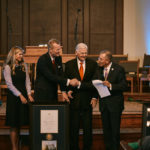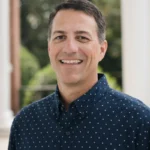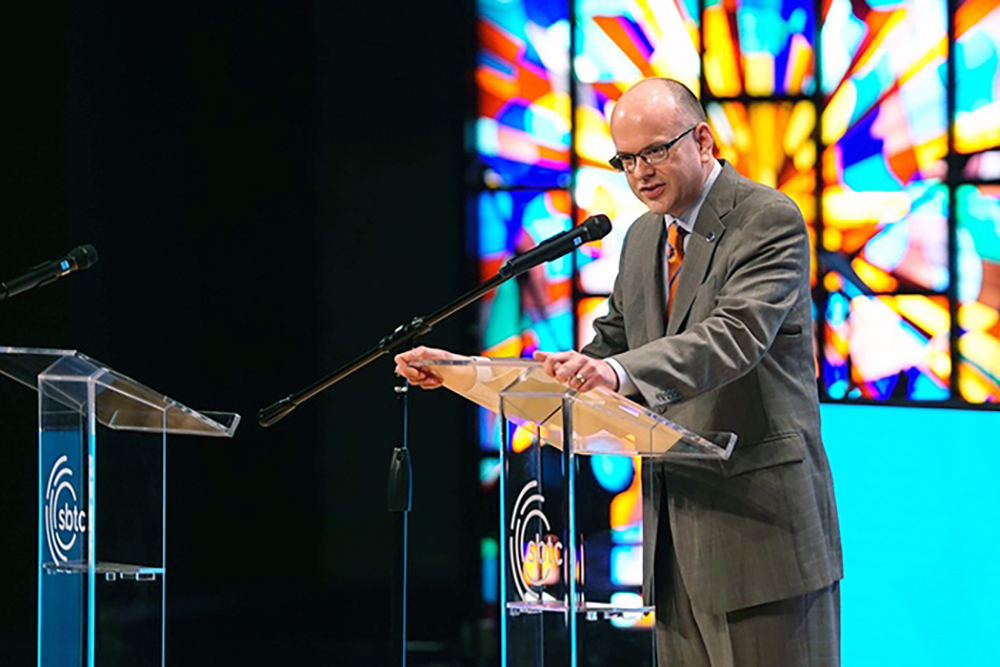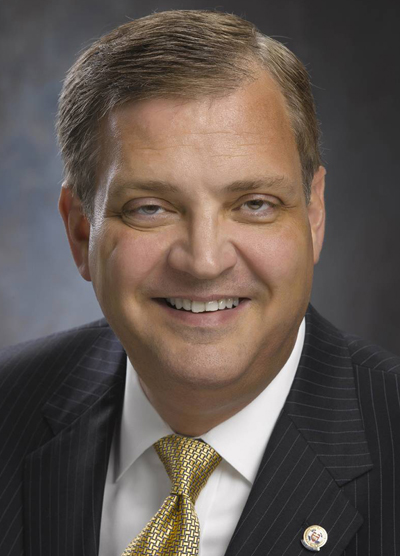
In today’s From the Seminaries:
Southern Baptist Theological Seminary
Southeastern Baptist Theological Seminary
Midwestern Baptist Theological Seminary
Dockery, at SBTS, sees evangelical/Southern Baptist benefit
LOUISVILLE, Ky. (BP) — Although evangelicals and Southern Baptists are similar but distinct movements in conservative Christianity, the two groups can remain complementary forces in advancing the Gospel, David W. Dockery said during the 2018 Norton Lectures at Southern Baptist Theological Seminary.
Both groups need to listen, eliminate stereotypes of the other, and work together as co-laborers for the growth of the Kingdom, Dockery said in the three-part series. “If we are willing to put aside our differences, we can mutually benefit and learn from one another.”
Evangelicalism has primarily functioned as a parachurch organism marked by its transdenominational character, said Dockery, president of Trinity International University in Deerfield, Ill., and a former Southern Seminary faculty member. During the revival movements in American history — from George Whitfield to Billy Graham — evangelicalism functioned without a developed ecclesiology, leading to inefficient church structures, Dockery said. Denominations, though they seem to be in decline, remain important structures, he said, because duplicated effort, funding challenges and mixed loyalties can hold the church back.
But, Dockery observed, “If we focus too much on structure we’ll end up on one side of the ditch, but if we focus too much on the Spirit, we will move toward an amorphous, shapeless kind of Christianity.”
Evangelicalism is entrepreneurial in spirit and marked by a transdenominational character, Dockery said, noting that it provided an alternative to Christian fundamentalist separationism, with the late evangelist Billy Graham giving the evangelical movement its open-hearted posture.
Historically, the evangelical movement emerged out of the fallout from the fundamentalist-modernist controversy in the early 20th century, Dockery recounted. In 1919, W.B. Riley — one of the heroes of the fundamentalist movement — argued that fundamentalists should emphasize more than doctrinal conviction. They also should also prioritize separation.
In response, evangelicalism pushed for ecumenism and non-separationism, Dockery said. Graham, whom fundamentalists rejected as apostate, held to theological fidelity (contrary to liberalism) and an ecumenical spirit (contrary to fundamentalism) to light the way forward.
“What is needed is a biblical orthodoxy, a historical Christianity, a faithful, intercultural, transcontinental and intergenerational evangelicalism,” Dockery said.
“Such a big-tent vision needs wisdom to avoid unintentionally moving in the direction of an unhealthy inclusivism or heterodoxical universalism,” he said. “Evangelicals need to prioritize their calling as servants, as agents of reconciliation in a world characterized by fragmentation.”
While the Southern Baptist Convention has long exemplified structural efficiency, Dockery characterized its theological legacy as up and down. The SBC was founded on firm convictions regarding the infallibility of Scripture and entered the second half of 20th century as a unified and efficiently run denomination, Dockery said. But the years between 1954 and 1979 brought controversy and questioning of the authority of Scripture from thinkers who emphasized the element of human authorship in the Bible.
Subsequent decades of discussion and controversy, however, culminated in a firm stance on biblical authority, Dockery continued. In 1993, when R. Albert Mohler Jr. was elected president of Southern Baptist Theological Seminary, he was elected “with a commitment to the inerrancy and authority of Scripture and a commitment to the importance of [the seminary’s original doctrinal statement] the Abstract of Principles,” Dockery said.
In light of its own theological reformation, Dockery said the efficiency of the Southern Baptist Convention can go hand-in-hand with the open-handed evangelical movement that inherited the theological legacy of the Protestant Reformation.
Dockery cited two of the touchstones of Southern Baptist life that emerged at the same annual meeting in 1925 — the Cooperative Program, a funding strategy which unifies Southern Baptist giving efforts to send missionaries around the world, and the Baptist Faith and Message, which is the confessional document of the convention, since updated in 2000. As “dialogue partners,” Dockery said, evangelicals can benefit from the ecclesiological efficiency and denominational distinctiveness of Southern Baptists, while Southern Baptists can benefit from the outward posture of transdenominational evangelicalism.
“The SBC has clearly decided that the truthfulness of the Bible cannot be ignored, de-emphasized or eliminated from the discussion,” Dockery said. Together, Southern Baptist evangelicals “can help churches enable and educate leaders, enhance worship in order to bring about renewal across the country and around the globe.”
Dockery has lived out the balance between the Southern Baptist Convention and evangelicalism in his own academic career in both Baptist institutions and the evangelical guild. He has previously served as a faculty member at Southern Seminary and led a Baptist college and currently is president of Trinity International University, a flagship institution of the evangelical world. He is also president of the Evangelical Theological Society and has served on numerous Southern Baptist committees.
“Can you be Southern Baptist and an evangelical? My life says yes,” Dockery said. “[I’ve had] one foot in Southern Baptist life and one foot in the evangelical world, and [I am] comfortable in both places.”
Dockery dedicated his March 27-28 2018 Norton lectures to Mohler, who celebrates the 25th anniversary of his election as the ninth president of Southern Seminary this year.
Video of Dockery’s lectures can be accessed at equip.sbts.edu under the Events tab.
Also at Southern, Mohler examined George Washington’s views on race at the seminary’s Leadership Briefing, April 26 in Heritage Hall on the Louisville, Ky., campus. For the article “Mohler: George Washington’s public virtue, though laudable, is insufficient,” click here.
Southeastern announces 4 new faculty members
WAKE FOREST, N.C. (BP) — Southeastern Baptist Theological Seminary has named four new faculty members, Julia Bickley, Ben Holloway, Jason Williamson and Otto Sanchez, according to a May 8 news release.
“These are men and women that love Christ, the Bible, the Gospel, the church and the nations,” said Danny Akin, SEBTS president.
Bickley will begin teaching at SEBTS June 1 as a fulltime assistant professor for ministry to women and also has been appointed as associate dean for graduate administration.
Bickley comes to Southeastern from Mid-America Baptist Theological Seminary, where she has served as director of campus life and institutional assessment as well as dean of women since 2011. She has taught as an MABTS adjunct faculty member since 2009. Bickley has experience teaching church ministries, introduction to research and writing and principles of teaching. She holds a Ph.D. in leadership from Southern Baptist Theological Seminary and an MABTS master of divinity in Christian education.
Holloway will begin teaching at SEBTS Aug. 1 as a fulltime instructor of philosophy and history of ideas. He will be coming to SEBTS from the Commission Leadership Academy, a K-9 classical Christ school in Raleigh, N.C., where he teaches logic, Latin, writing and leadership. Holloway currently is pursuing a Ph.D. at SEBTS and holds a master of arts in philosophy of religion from Trinity Evangelical Divinity School in Deerfield, Ill.
Williamson started teaching at SEBTS on Feb. 12 as a part-time associate professor of business and entrepreneurship for the College at Southeastern, the undergraduate arm of SEBTS. Along with teaching at the college, Williamson works for Oracle, an international computer software company, currently working as vice president of Startup Ecosystems Oracle. Williamson holds a master’s in management of I.T. from the University of Virginia.
Sanchez was appointed to the SEBTS faculty last October as a visiting professor of preaching and pastoral ministry. He is from Santo Domingo, Dominican Republic, where he teaches and is president at the Seminario Teológico Bautista Dominicano. He is also the president of Baptist convention in the Dominican Republic. Sanchez received his diploma in 2013 in theology and pastoral ministry through the Langham Preaching seminar in Cochabamba, Bolivia, part of a larger organization called Langham Partnership founded by the late John Stott to promote training and resources for indigenous pastors and leaders. Sanchez also received his Th.M. in pastoral ministry in 2012 from the Southern Baptist School for Biblical Studies in Jacksonville, Florida.
Midwestern journal looks at “Biblical Theology and Missions”
KANSAS CITY, Mo. (BP) — “Biblical Theology and Missions” is the theme of the Spring 2018 issue of the Midwestern Journal of Theology, released April 30 by Midwestern Baptist Theological Seminary, featuring works by newly-elected research professor Andreas Köstenberger and others.
MBTS President Jason Allen said the new MJT edition is “especially gratifying for Midwestern Seminary as it foreshadows the coming tenure of our newest elected faculty member, Dr. Andreas Köstenberger, by featuring his recent lectureship series held on our campus.” Allen described Köstenberger as “among the foremost New Testament scholars in conservative evangelicalism.”
Journal editor Michael McMullen, professor of church history at Midwestern, noted that this issue of the MJT highlights “several thought-provoking pieces that shine light on the outworking of biblical theology and the practice of missions.”
Köstenberger’s 2018 Sizemore Lectures addressed “The Promise and Practice of Biblical Theology,” in which he examined how biblical theology “tries to bring us closer to Scripture by helping us see what the biblical writers themselves believed so we can conform our beliefs to theirs.”
Among the theology-related articles in the journal are “Some Knowledge of Hebrew Possible to All: The Value of Biblical Hebrew for the Church” by Stephen J. Andrews, MBTS professor of Hebrew and Old Testament; “Epigenetics and Homosexuality: A Brief Survey and Analysis” by J. Alan Branch, professor of ethics, examining the relationship between epigenetics, the chemical modifications of the human genome, and the idea of biological determination of sexual identity; and “Weapons, Wealth, and the End of the World: Haggai 2:6-7 in 1QM XII, 14; XIX, 6; and Hebrews 12:26-27” by Todd Chipman, assistant professor of biblical studies, providing a worldview comparison between Hebrews, a Qumran scroll and one of the minor prophets.
Among the missions-themed articles are “God’s Heart for Missions: A Biblical Theology of the Great Commission” by Midwestern Ph.D. student Jason Alligood, teaching pastor of Fellowship Bible Church in Peoria, Ill., and “A Comparison of Native American Missional Methodology: The Moravians and the New Lights” by J. Tristan Hurley, adjunct professor at the L.R. Scarborough College of Southwestern Baptist Theological Seminary in Texas.
The Midwestern Seminary Journal of Theology is available in print for subscribers. To subscribe, contact the seminary’s academic office at 816-414-3745 or [email protected]. Additionally, the issue can be viewed for free on the seminary’s website, www.mbts.edu/journal.



















